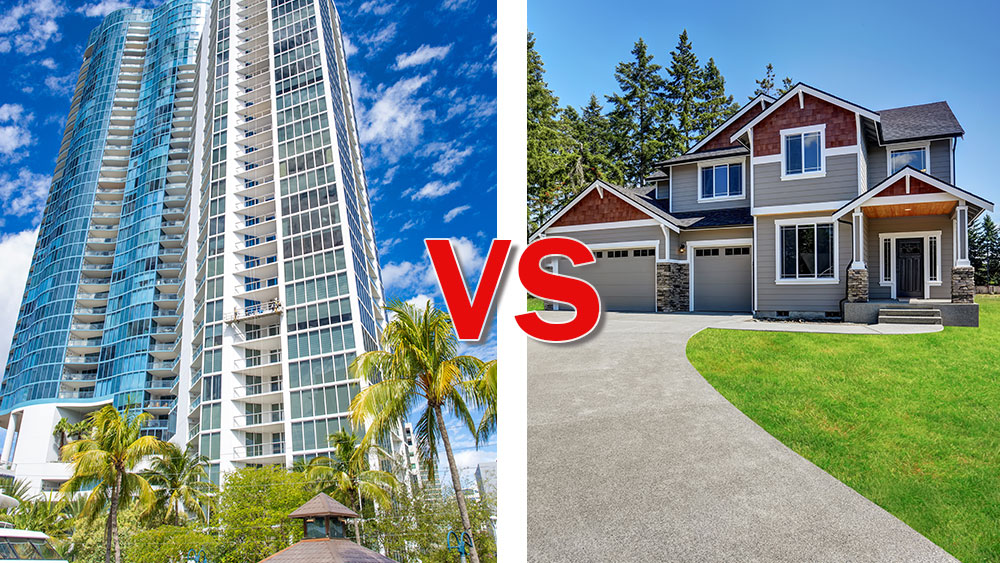Condos vs. Single-Family Homes: What’s the Difference, Pros and Cons

A perpetual question lingers across the real estate industry: Should homebuyers invest in condominiums or single-family homes?
Both housing options have distinct attributes, each appealing to different demographics based on lifestyle, financial status, and personal preferences. This article sheds light on this debate, comparing these two prominent housing choices.
Core Definitions: Condos vs. Single-Family Homes
At the outset, understanding the fundamental distinctions between condominiums and single-family homes is paramount.
A condominium, commonly called a condo, is typically a unit in a larger building or complex. Unlike apartments, these units are purchased, not rented. While owners possess individual units, shared amenities and certain external areas are jointly owned by all residents.
A single-family home, by contrast, is a standalone structure on its independent plot of land, typically designed to house one family. It offers exclusive rights to the property, both the building and the land it occupies.
Structural and Design Differences
Architectural nuances differentiate these property types. Condominiums often mirror apartment-style structures and might be part of high-rise buildings in urban settings. They could include balconies or small patios but lack extensive outdoor spaces. The design emphasizes community living, shared hallways, entrances, and amenities.
Single-family homes, however, are standalone structures boasting their design variety. From sprawling ranch styles to multi-story designs, these homes often come with private yards. They do not share walls with neighboring properties, offering more seclusion.
Ownership, Maintenance, and Responsibilities
The ownership dynamics between these two housing types diverge significantly.
In a condo, individuals own their unit’s interior space. However, external areas like hallways, gardens, and amenities fall under collective ownership. A condominium association, funded by residents’ dues, typically manages these shared spaces.
On the other hand, single-family homeowners bear sole responsibility for their home’s interior and exterior, including any yard or garden areas. This ownership implies complete autonomy in maintenance decisions but also means that all tasks, from lawn mowing to roof repairs, rest on the homeowner’s shoulders. Furthermore, some communities have a homeowners association (HOA) that manages common property and sets rules for residents.
Financial Implications: Costs and Investment Potential
Financial considerations are paramount in the condo versus single-family home debate.
- Initial Purchase Costs: Typically, condos have a lower initial purchase price than single-family homes in the same area. However, this isn’t a universal rule and can vary based on location and the condo’s amenities.
- Ongoing Costs: Condo owners often pay condominium association fees, which cover maintenance, amenities, and communal services. Single-family homeowners may (or may not) have HOA fees.
The investment potential for both varies. Historically, single-family homes have seen steady appreciation. However, condos can offer robust returns, especially those in sought-after urban locales.
Lifestyle Considerations in Choosing a Home
Lifestyle plays an undeniable role in this decision-making process.
With their urban settings, condos cater to those who prioritize proximity to city amenities, such as dining, entertainment, and work. They’re often a fit for professionals, young couples, or retirees seeking a low-maintenance lifestyle.
Single-family homes, conversely, often allure those desiring space, privacy, and a touch of nature. Families with children, for instance, might prioritize a backyard or proximity to specific schools.
Pros of Living in a Condominium
Condominiums offer a unique lifestyle characterized by convenience and community. Some key advantages include:
- Amenities: Modern condos often boast shared amenities like pools, fitness centers, and event spaces.
- Security: Many condo complexes have enhanced security features, from gated entrances to round-the-clock security personnel.
- Community: Living in close quarters fosters a sense of community, making it easier to forge relationships with neighbors.
Pros of Investing in a Single-Family Home
Single-family homes aren’t without their unique set of advantages, including:
- Privacy: Without shared walls or floors, these homes offer unparalleled privacy.
- Freedom: Homeowners can often customize and renovate their space without community approval.
- Space: Larger square footage, including outdoor areas like yards and gardens, cater to those who crave space.
Closing Points: Weighing the Pros and Cons
The age-old debate of condos versus single-family homes has no one-size-fits-all answer. Both housing types offer distinct advantages that cater to diverse needs and lifestyles.
With their maintenance-free approach, modern amenities, and urban locations, condominiums appeal to those who value convenience and community interaction. On the other hand, single-family homes, emphasizing space, privacy, and customization potential, resonate with individuals and families looking for a more traditional housing experience, autonomy in decision-making, and a direct connection with nature.
Prospective buyers should carefully evaluate their current lifestyle, financial situation, and future aspirations when deciding between a condo and a single-family home. Engaging with real estate professionals, conducting thorough research, and considering personal preferences will undoubtedly pave the way for an informed and satisfying decision.
